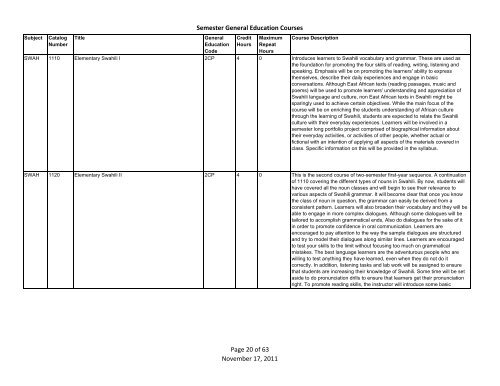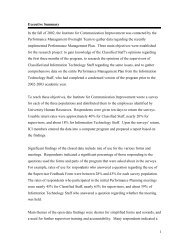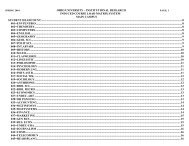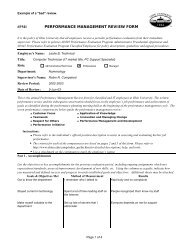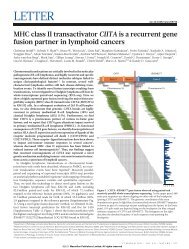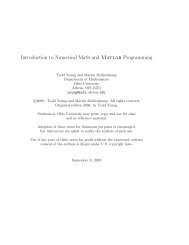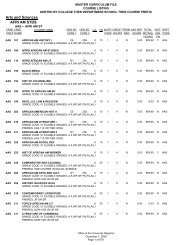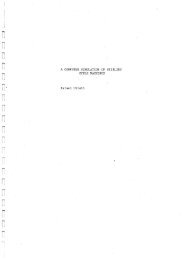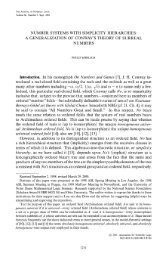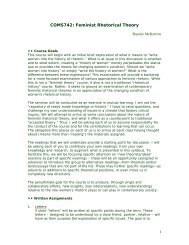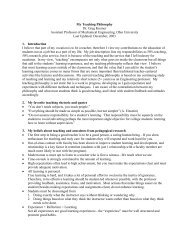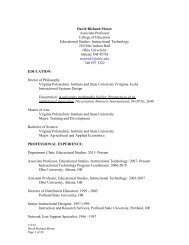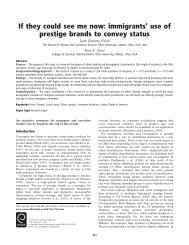Semester General Education Courses - Ohio University
Semester General Education Courses - Ohio University
Semester General Education Courses - Ohio University
You also want an ePaper? Increase the reach of your titles
YUMPU automatically turns print PDFs into web optimized ePapers that Google loves.
Subject<br />
Catalog<br />
Number<br />
Title<br />
<strong>Semester</strong> <strong>General</strong> <strong>Education</strong> <strong>Courses</strong><br />
<strong>General</strong><br />
<strong>Education</strong><br />
Code<br />
Credit<br />
Hours<br />
Maximum<br />
Repeat<br />
Hours<br />
Course Description<br />
SWAH 1110 Elementary Swahili I 2CP 4 0 Introduces learners to Swahili vocabulary and grammar. These are used as<br />
the foundation for promoting the four skills of reading, writing, listening and<br />
speaking. Emphasis will be on promoting the learners' ability to express<br />
themselves, describe their daily experiences and engage in basic<br />
conversations. Although East African texts (reading passages, music and<br />
poems) will be used to promote learners' understanding and appreciation of<br />
Swahili language and culture, non East African texts in Swahili might be<br />
sparingly used to achieve certain objectives. While the main focus of the<br />
course will be on enriching the students understanding of African culture<br />
through the learning of Swahili, students are expected to relate the Swahili<br />
culture with their everyday experiences. Learners will be involved in a<br />
semester long portfolio project comprised of biographical information about<br />
their everyday activities, or activities of other people, whether actual or<br />
fictional with an intention of applying all aspects of the materials covered in<br />
class. Specific information on this will be provided in the syllabus.<br />
SWAH 1120 Elementary Swahili II 2CP 4 0 This is the second course of two-semester first-year sequence. A continuation<br />
of 1110 covering the different types of nouns in Swahili. By now, students will<br />
have covered all the noun classes and will begin to see their relevance to<br />
various aspects of Swahili grammar. It will become clear that once you know<br />
the class of noun in question, the grammar can easily be derived from a<br />
consistent pattern. Learners will also broaden their vocabulary and they will be<br />
able to engage in more complex dialogues. Although some dialogues will be<br />
tailored to accomplish grammatical ends, Also do dialogues for the sake of it<br />
in order to promote confidence in oral communication. Learners are<br />
encouraged to pay attention to the way the sample dialogues are structured<br />
and try to model their dialogues along similar lines. Learners are encouraged<br />
to test your skills to the limit without focusing too much on grammatical<br />
mistakes. The best language learners are the adventurous people who are<br />
willing to test anything they have learned, even when they do not do it<br />
correctly. In addition, listening tasks and lab work will be assigned to ensure<br />
that students are increasing their knowledge of Swahili. Some time will be set<br />
aside to do pronunciation drills to ensure that learners get their pronunciation<br />
right. To promote reading skills, the instructor will introduce some basic<br />
Page 20 of 63<br />
November 17, 2011


